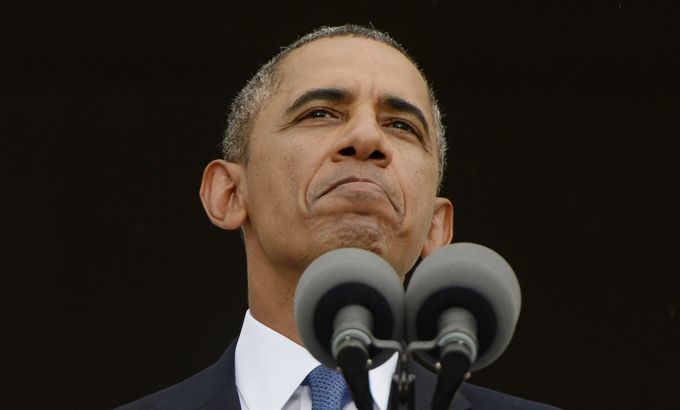Obama advocates limited strikes in Syria
US President says has “concluded” that Syrian government carried out chemical attacks and must face “consequences”.

The US President, Barack Obama, says the United States has “concluded” that the Syrian government has used chemical weapons against civilians, and advocated the use of a “tailored, limited” military strike in response.
Obama was referring to an alleged chemical weapons attack in the Damascus suburb of Ghouta last week that aid agencies say killed at least 355 people, and injured as many as 3,000 others.
I have no interest in any open-ended conflict in Syria, but we do have to make sure that when countries break international norms on weapons like chemical weapons that could threaten us, that they are held accountable
In an interview with the US-based Public Broadcasting Service (PBS) on Wednesday, Obama said that he had not yet made a decision on the specific kind of military action to take, but he also left little doubt that such action would take place.
“We have concluded that the Syrian government in fact carried these out,” Obama said in the televised interview, “and if that’s so, then there need to be international consequences” in order to deter the government from repeating such an attack.
Obama did not present any direct evidence to back up his assertion that the Syrian government bears responsibility for the alleged attack, and the government has strongly denied accusations that it was involved.
Arguing for measured intervention after long resisting deeper involvement in Syria, Obama insisted that while President Bashar al-Assad’s government must be punished, he intended to avoid repeating the errors made in the 2003 Iraq war.
“I have no interest in any open-ended conflict in Syria, but we do have to make sure that when countries break international norms on weapons like chemical weapons that could threaten us, that they are held accountable,” Obama said.
The most likely option, US officials say, would be to launch cruise missiles from US ships in the Mediterranean in a campaign that would last several days.
Obama cited chemical weapons dangers to the US Middle Eastern allies Israel, Turkey and Jordan plus the US bases in the region, and said the US national interests could be at risk if Syrian chemical arms fell into the wrong hands.
UN deadlock
New hurdles have, however, emerged that appear to have slowed the formation of an international coalition that could use military force to hit Syria.
Earlier on Wednesday, the five permanent members of the United Nations Security Council failed to reach an agreement on a draft resolution from the British seeking authorisation for the use of force.
Russia objected to international intervention, after its Foreign Minister Sergei Lavrov earlier rejected the case for ascribing culpability to the Syrian government at this time, adding that foreign military intervention would lead to “destabilisation of […] the country and the region”.
Chinese state media on Thursday said that any military intervention “would have dire consequences for regional security and violate the norms governing international relations”.
Obama administration officials say they would take action against the Syrian government even without the backing of allies or the United Nations, because diplomatic paralysis must not prevent a response to the alleged chemical weapons attack outside the Syrian capital last week.
Despite the administration’s assertions that it would press forward without the UN, momentum for international military action appeared to slow.
The British Prime Minister, David Cameron, promised British lawmakers he would not go to war until a UN chemical weapons team on the ground in Syria has a chance to report its findings, pushing the UK’s involvement in any potential strike until next week at the earliest.
Cameron called an emergency meeting of parliament on Thursday to vote on whether to endorse international action against Syria, at the same time as his country’s military deployed six Typhoon fighter jets to an airbase in Cyprus.
French President Francois Hollande, meanwhile, said on Thursday that a political solution remained the goal in Syria, but that this could only be achieved “if the international community can put a temporary stop to this escalation of violence”. The French military says that it is ready to commit forces to Syria if given the order by President Hollande.
‘Graveyard of invaders’
Syria, which is believed to have one of the world’s largest stockpiles of chemical weapons, has denied the charges.
Syria’s government blamed rebel “terrorists” for releasing the toxins with the help of the US, Britain and France, and said it would be a “graveyard of invaders”.
Syrian officials say the West is playing into the hands of its al-Qaeda enemies.
Some US lawmakers, meanwhile, are calling for Obama to seek congressional approval for a military action.
Specifically, in a letter to Obama, House Speaker John Boehner said it was “essential you address on what basis any use of force would be legally justified”.
The Obama administration is planning to hold an intelligence teleconference briefing on Syria for leaders of the House and Senate and the national security committees in Congress on Thursday, US officials and congressional aides said.
Officials also said an unclassified version of the report by the Office of the Director for National Intelligence would be made public this week.